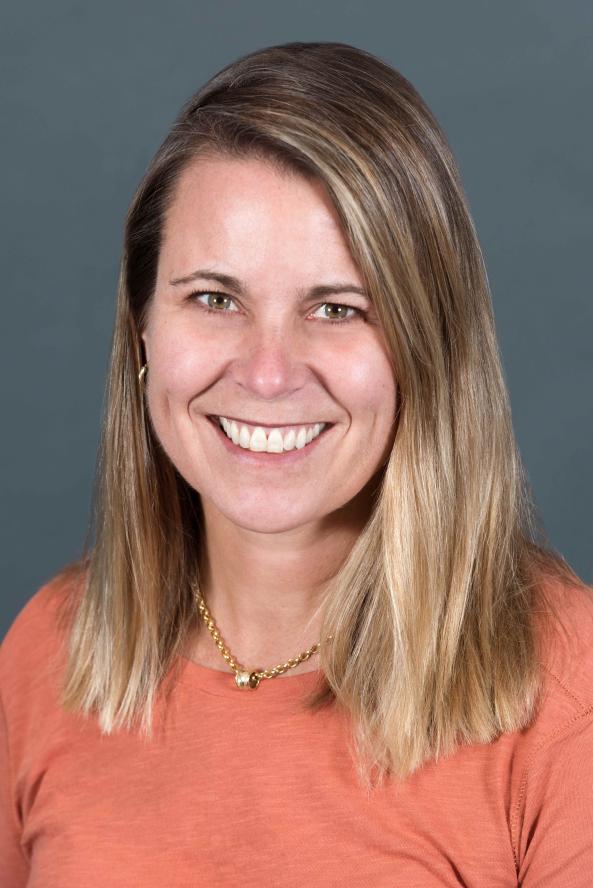Learning By Doing

By: Maisie O'Brien
In Jennifer Buxton’s courses, students are encouraged to roll up their sleeves and innovate. Hunkering down in Tufts’ design and fabrication studios, students are charged with building personalized assistive technology (AT) devices for individuals with a disability. In past courses, students have created 3D-printed joysticks, drinking systems, communication devices, modified keyboards, and adapted art supplies.
“I’m a big believer in learning by doing,” Buxton says. “I try to incorporate as much hands-on activity into the classroom as possible and bring in guest speakers to discuss real-world applications and challenges. It’s such a valuable experience for students to learn how to interview a client, problem solve, and iterate solutions to come up with a device that helps someone lead a fuller, richer life.”
Buxton teaches the Assistive Technology Foundations course in the fall. This year, 55 students from the course created 18 custom AT devices for individuals with disabilities in the Greater Boston area. They also partnered with local hospitals, schools, and adult day programs to make the devices. Her spring course, Assistive Technology Innovations, builds upon her fall course and explores high and low tech ways to create AT devices, using everything from 3D printers and lines of code to cardboard and tape.
Her courses are among the few OT offerings that are open to non-OT students, including those studying engineering psychology, human factors engineering, mechanical engineering, and computer science.
In 2020, Buxton and Professor Emeritus Gary Bedell revived the Certificate in Assistive Technology, which consists of three classes incorporating a variety of disciplines, including occupational therapy, mechanical engineering, human factors engineering, computer science, and an optional independent study. That same year, Buxton founded the Tufts Assistive Technology Hackathon, taking place for the fourth time this April. At the hackathon, local “co-designers” with disabilities identify AT devices to ideate, design, and fabricate with students from Tufts as well as the Institute of Health Professionals and Boston University.
“I’m motivated to do this work because of the significant improvements that can occur once clients have an assistive device or intervention that’s effective,” says Buxton. “I’ve worked with many clients who have endured severe physical trauma, such as acute brain and spinal cord injuries. It’s worth all the effort to learn about their goals and help them achieve them. I also love being a teacher and introducing soon-to-be clinicians to cutting-edge technology. It’s an exciting and rewarding time to be in this field.”
Buxton was first introduced to the field of OT as a child when her aunt suffered a spinal cord injury and was receiving services. OTs helped her aunt get back to doing the things she valued most, like driving, applying makeup, and playing cards. “Those were her most meaningful occupations,” laughs Buxton. “I knew I wanted to work in healthcare and when I asked my aunt what I should study in college, she said OT because it made the biggest difference in her recovery. It’s been a great career path for me.”
Buxton received her BS in OT from the University of New Hampshire and her post-professional master’s degree in OT from Tufts in 2003. She held a series of positions at Spaulding Rehabilitation Hospital’s Assistive Technology Center and started a consulting business, partnering with schools to implement assistive technology interventions for children with disabilities. She then earned a master's in special education at Regis College to help strengthen her skills in working with school aged children with complex profiles. She is currently working at Boston Children’s Hospital’s Augmentative Communication Program, while teaching part time at Tufts.
At Tufts, Buxton is a leader in the tech space and is working with other faculty to ensure the program keeps up to date with the latest advancements. “I enjoy collaborating with the other faculty,” she says. “Our program has strengthened over the years and we have such deep and broad skill sets. No one is really doing the same things, which creates a special, well-rounded experience for our students.
Outside of teaching and her work in assistive technology, Buxton loves the outdoors and regularly hikes, bikes, skis, and coaches youth soccer. She is a proud mom of three and hopes to become an adaptive ski instructor when she retires.